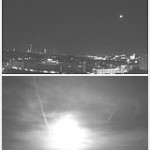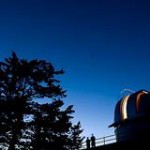Tag Space & astronomy
Astronomers discover how mysterious blue straggler stars stay young
Mysterious "blue stragglers" are old stars that appear younger than they should be: they burn hot and blue. Several theories have attempted to explain why they don't show their age, but, until now, scientists have lacked the crucial observations with which to test each hypothesis.
Clocking the mosh pit of interstellar space
The space between the stars in the Milky Way and all other galaxies is full of dust and gas, the raw materials from which stars and planets are made.
Astronomy technique could help assess deadly melanomas
As a young graduate student with a passion for surfing, Andy Sheinis soaked up a lot of California sun.
Dec. 21 total lunar eclipse and UW Space Place eclipse party planned
Clear skies permitting, an extraordinary lunar eclipse will be visible from Wisconsin in the early morning hours of Tuesday, Dec. 21.
Curiosities: Why is Pluto not considered a planet?
Until 2006, astronomers had not carefully defined “planet,” says James Lattis, director of the UW Space Place. Asteroids were not considered planets because…
Curiosities: Why do stars appear to twinkle in the night sky?
Courtesy European Space Agency (ESA/Hubble). Stars twinkle because we view them through our atmosphere, says James Lattis, director of University of Wisconsin–Madison…
Curiosities: Why do some planets have rings?
Saturn imaged by the Cassini Orbiter. Image: courtesy Jet Propulsion Lab Planetary ring systems are complicated, notes UW Space Place…
Recent sightings: Nighttime fireball
Moments before bursting in a dazzling fireball over southwestern Wisconsin, a likely meteor appears as a bright dot in the Wednesday night sky. This…
Stellar mosh pit, complete with crashing stars, resolves a mystery
For almost 50 years, astronomers have puzzled over the youthful appearance of stars known as blue stragglers.
Satellite anniversary marks 50 years of studying climate from space
On Oct. 13, 1959, University of Wisconsin–Madison professors Verner Suomi and Robert Parent crouched in a bunker at Cape Canaveral, sweating through the countdown for the Juno II rocket perched on its launching pad 150 yards away.
Scientists hope to mimic nature’s dynamos
In the cosmos, all celestial objects - planets, stars, galaxies and clusters of galaxies - have magnetic fields. On Earth, the magnetic field of our home planet is most easily observed in a compass where the needle points north.
Historic Washburn Observatory prepares to reopen
The Washburn Observatory, the University of Wisconsin–Madison's gate to the heavens, will open later this month following a careful two-year renovation that preserved its hilltop charm and historic significance.
Curiosities: How big is space?
Space is probably infinite, but we can see only the part that contains stars or galaxies whose light has been able to reach us, says…
Curiosities: How many galaxies have humans discovered?
“We don’t know,” says Ed Churchwell, professor of astronomy. “We know it’s a very large number.” It’s in the hundreds of billions, Churchwell…
From Earth to the universe to Capitol Square
On Saturday, June 27, wonders from the far reaches of the universe will be brought down to Earth on the Capitol Square.
‘Planet Trek’ offers chance to walk or bike scale model of solar system
The University of Wisconsin–Madison Space Place and the Monona Terrace invite the public to Planet Trek Fest at Monona Terrace on Saturday, June 20.
‘Galileo Under Wisconsin Skies’ to celebrate astronomy at UW–Madison
"Galileo Under Wisconsin Skies," a series of special events presented by the University of Wisconsin–Madison Department of Astronomy July 19-22, will commemorate the 400th anniversary of Galileo's telescope, the International Year of Astronomy and the renovation of Washburn Observatory at UW–Madison.
Planet Trek offers chance to bike or walk through scaled-down solar system
Dane County residents have a new way to appreciate the solar system, thanks to Planet Trek Dane County, which offers pedestrians and bikers a chance to discover the 11 biggest objects in the solar system at the correct scale of size and distance.
Space Place, MMSD plan celebration of 100 Hours of Astronomy
Few areas of science enchant us as much as astronomy. We view the stars each night; we make connections between astronomy and many other scientific fields. Rarely, though, do we get a chance to explore the heavens through organized events.












